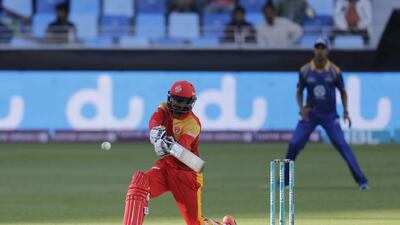Islamabad United 132 for eight (Latif 39, Bopara 2-25)
Karachi Kings 130 for nine (Bopara 32 not out, Ajmal 3-27)
Islamabad United won by two runs
DUBAI // It feels as though a set of fallen stars of Pakistan cricket are taking turns at rejuvenation at the start of the HBL Pakistan Super League.
Two days earlier, Mohammed Amir had given the new Twenty20 extravaganza its first compelling headline, when he took a hat-trick to set up an opening win for Karachi Kings.
The young left-arm pace-bowler, who is rebuilding his reputation after five years out due to a ban for spot-fixing, had his chance to be a hero again here.
Instead, he had to defer to Saeed Ajmal, the former champion off-spinner whose own career might have been dealt a seminal blow when his bowling action was deemed illegal 17 months ago.
Now 38, he has refused to give in. His performance in taking three vital wickets to set up a two-run win - Islamabad United’s first in the PSL, at the third attempt - was proof he can be a force with his new, reconstructed method, too.
It was after a match on these 22 yards of turf that the veracity of Ajmal’s action was first most volubly queried.
In the first international series played at the Dubai International Stadium in 2009, the offspinner said Shane Watson had suggested the umpires scrutinise him. It is an accusation the Australian player strenuously denied.
Nearly seven years on, they are teammates. Both had a role to play in their team’s first PSL win.
Ajmal’s three-wicket swag derailed the Karachi side’s pursuit of 133 to win. The Kings still had a chance when Watson, with Islamabad captain Misbah-ul-Haq off the field due to injury, took the responsibility to bowl the last over himself.
Sixteen were required with two wickets left, which became 15 when Usama Mir was run out off a wide.
Amir, batting at No 11, hit the first ball he faced for four. Then he escaped being run out by the wicketkeeper Sam Billings when the underarm throw deflected off the stumps without dislodging the bails.
Between Amir and Ravi Bopara, they whittled the equation down to 10 off the last two balls. Bopara hit the penultimate ball over the ropes, but could only smash the final ball as far as his front leg.
Star man
Ajmal was beaming when he was handed the match award. He was a worthy recipient, having picked up the wickets of James Vince, Saifullah Bangash and the influential Shakib Al Hasan with his recently-remodelled offspin.
His teammate, Mohammed Sami, might have had a decent claim, too, having hit a vital 20 at the tail end of the United innings, then sent down a fine four-over spell. Being hit for six off a no-ball blotted his copybook, though.
What they said
Shane Watson (Islamabad United allrounder): “We just scraped home and it was a very important win for us after losing our first two games. I just tried to get the yorker off the last ball, luckily it came off a bit better than before. This should give us confidence.”
Shoaib Malik (Karachi Kings captain): “We could have done better. I am disappointed but it is part of the game. We had our chances and could have done better. Tomorrow is a new day, hopefully we’ll come back with a new plan.”
The National Verdict
Six run outs in the match are a clue to the fact slow-scoring pitches can drive batsmen to distraction. They can make for compelling viewing, though, and this slow burner climaxed in classic fashion. Surely the match of the competition so far, even if it was shy of fours and sixes.
pradley@thenational.ae
Follow us on Twitter @NatSportUAE
Like us on Facebook at facebook.com/TheNationalSport


